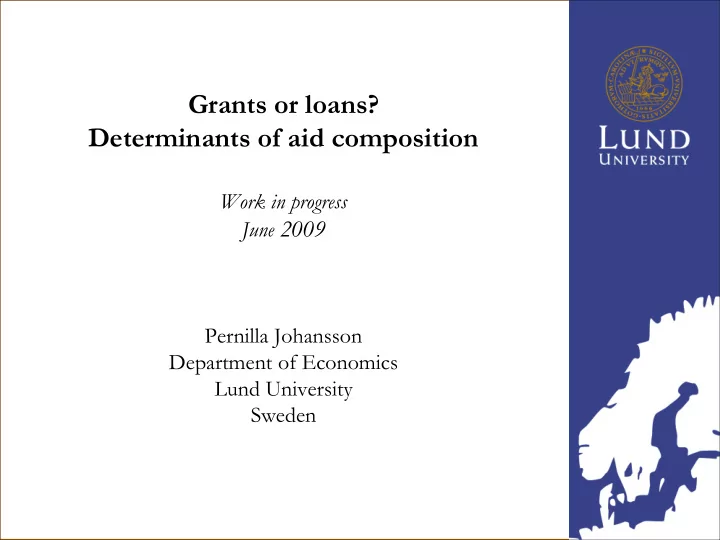

Grants or loans? Determinants of aid composition Work in progress June 2009 Pernilla Johansson Department of Economics Lund University Sweden
Background Donors provide foreign aid as a mix of - Pure grants (71 percent of gross aid flows, 2004) - Concessional loans Poor countries are heavily indebted - Pure grants do not add to the debt stock - Concessional loans add to the debt stock
Importance of the grant – loan mix Relation to debt sustainability Distinct growth effect (e.g. Dovern & Nunnenkamp 2007) Distinct fiscal impact (e.g. Odedokun 2004) Variation of the grant – loan mix across countries ODA/GDP Grant/ODA Bhutan 16 89 Guyana 16 42 South Africa 0.3 93 Argentina 0.1 50 Note: Average from 1970 to 2004.
Aid allocation literature – total aid The existing aid allocation literature focuses on total aid (e.g. Alesina and Dollar 2000, Berthélemy 2006, Easterly 2007) Recipient needs and merits as well as donors’ self - interest influence allocation decisions
Aid allocation literature – disaggregated aid A few studies disaggregate aid into grants and loans - Odedokun (2003): donor perspective - Bertélemy (2006): grants/GDP - Marchesi and Missale (2007): grants/GDP, loans/GDP - Ratha (2005): World Bank loans/GDP
Research question What recipient country characteristics determine the grant – loan allocation?
Grants and loans: definition The grant ratio Grant ratio=ODA grants/(ODA grants + ODA loans extended) The grant element Grant element=(face value - pv of debt service payments)/face value Disbursement data (commitment data)
Descriptive statistics, 1970 – 2004 Pure grants dominate aid disbursements (68%) The average grant element is 43 percent. Donors have replaced loans by grants Allocation by region Grants and loans by recipient region.ppt Bilateral and multilateral donors differ.
Potential determinants of the grant – loan mix Radelet and Chiang (2003) Recipient need H1: Poorer countries receive a larger share of aid as grants. Prospect for growth H2: Countries with a higher quality of institutions and polices receive a larger share of aid as loans. H3: Countries with a good growth record receive a larger share of aid as loans.
Potential determinants of the grant – loan mix Risk of shocks H4: Countries facing greater risk in terms of price volatility receive a larger share of aid as grants. H5: Political unstable countries receive a larger share of aid as grants. Capacity to borrow H6: More indebted countries receive a larger share of aid as grants. H7: Countries with a history of paying more debt service receive a larger share of aid as loans H8: High inflation countries receive a larger share of aid as grants.
Potential determinants of the grant – loan mix Control variables Total level of aid (per capita) - Recipient population -
Modeling framework Time period: 1970 – 2004 70 developing countries (26 low-income) Explanatory variables lagged and calculated as a moving average over the three most recent years. Bilateral and multilateral aid separately (grant ratio) Changes over time Fixed effect and logit estimation
Results: baseline regressions Regression table 1.ppt Poorer countries receive relatively more grants Some evidence that prospect for growth influence multilateral aid composition Some evidence that political unstable countries receive more grants as a percentage of bilateral aid No evidence that the debt stock influence aid composition
Results: baseline regressions (contd.) Some evidence that countries who pay more debt service receive relatively more loans (more concessional loans). The level of aid and recipient population are significant.
Results: changes over time Comparison of the 1970 to 1989 period and 1990 to 2004 period Few changes No evidence that indebtedness influence aid composition in the second period (positive and significant in the first period for multilateral aid).
Conclusion and future research Recipient need rather than indebtedness determines the grant – loan mix as poorer countries receive relatively more grants. Behavior of individual donors Interdependencies in aid composition among donors
Recommend
More recommend